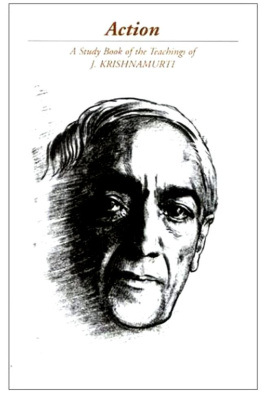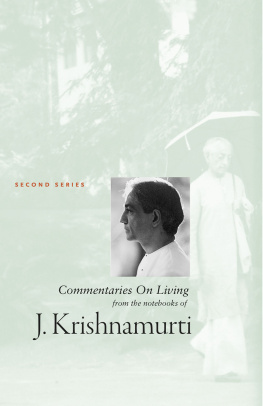Krishnamurti - Understanding Ourselves
Here you can read online Krishnamurti - Understanding Ourselves full text of the book (entire story) in english for free. Download pdf and epub, get meaning, cover and reviews about this ebook. publisher: Krishnamurti Foundation Trust, genre: Religion. Description of the work, (preface) as well as reviews are available. Best literature library LitArk.com created for fans of good reading and offers a wide selection of genres:
Romance novel
Science fiction
Adventure
Detective
Science
History
Home and family
Prose
Art
Politics
Computer
Non-fiction
Religion
Business
Children
Humor
Choose a favorite category and find really read worthwhile books. Enjoy immersion in the world of imagination, feel the emotions of the characters or learn something new for yourself, make an fascinating discovery.

- Book:Understanding Ourselves
- Author:
- Publisher:Krishnamurti Foundation Trust
- Genre:
- Rating:4 / 5
- Favourites:Add to favourites
- Your mark:
- 80
- 1
- 2
- 3
- 4
- 5
Understanding Ourselves: summary, description and annotation
We offer to read an annotation, description, summary or preface (depends on what the author of the book "Understanding Ourselves" wrote himself). If you haven't found the necessary information about the book — write in the comments, we will try to find it.
Understanding Ourselves — read online for free the complete book (whole text) full work
Below is the text of the book, divided by pages. System saving the place of the last page read, allows you to conveniently read the book "Understanding Ourselves" online for free, without having to search again every time where you left off. Put a bookmark, and you can go to the page where you finished reading at any time.
Font size:
Interval:
Bookmark:
Understanding Ourselves
Part One was originally published as Talks and Discussions at Brockwood Park 1969, Copyright 1970 The Krishnamurti Foundation London. This revised edition including new Part Two Copyright 1999 Krishnamurti Foundation Trust, Ltd. All rights reserved.
Front cover photograph by Mary Zimbalist. Back cover photograph by Friedrich Grohe. Copyright 1999 Krishnamurti Foundation Trust, Ltd. All rights reserved.
Edited by Ray McCoy
Understanding Ourselves
J Krishnamurti
Celebrating the First Thirty Years
of Brockwood Park School
Krishnamurti Foundation Trust, Ltd 1999
C ONTENTS
The First Public Talks and Discussions at Brockwood Park in 1969
Krishnamurti and Education at Brockwood Park School
Foreword
Krishnamurti gave these public talks to large audiences at Brockwood Park in the first year of the Schools existence.
It seems particularly appropriate that they should be published again now, to mark Brockwoods Thirtieth Year Anniversary. This new edition also includes a dialogue between Mary Zimbalist and Mary Cadogan, who are two of the Trustees. Their discussion took place at the Brockwood Park Educational Centre in 1997, and it describes Krishnamurtis approach to starting the School and his deep, continuing involvement in it.
Part One
Understanding Ourselves
L IVING W ITHOUT R ESISTANCE
I feel that I ought to be sitting on the ground with all the rest of you instead of up here on this platform. I think it must be understood from the very beginning that this is not a position of authority. Im not sitting up here as a kind of Delphic Oracle laying down the law or trying to persuade you to any particular kind of attitude, action or thought. But since we are here, apparently in all seriousness, and since you have taken the trouble to come, I think we ought to find out why human beings throughout the world live in isolation, divided by their particular beliefs, pleasures, problems and ideals. We find them belonging to various groups such as the Communists, the socialists, the Christians, Hindus and Buddhists, all further dividing themselves into innumerable sects with their own particular dogmas.
Why do we live with this sense of duality, opposing each other at all levels of our existence, resisting each other and bringing about conflict and war? This has been the pattern of human activity throughout the world probably from the very beginning of timethis sense of separation dividing the artist, the soldier, the musician, the scientist, the so-called religious man, the man of business. Although they talk of love and peace on earth, in this way there can be no peace, in this way we must be at war with each other. One wonders whether it must always be like this.
Is it possible for human beings who are serious to find out if they can live in a state of non-duality, not ideologically or theoretically, but actually, both in form and essence? Is it at all possible for you and me to live a life in which this sense of duality ceases completely, not only at the verbal level, but also in the deeper layers and recesses of the mind? I feel that if this is not possible, then we must continue at war with each other, you with your particular opinions, beliefs, dogmas and conclusions and I with mine, so there is never real communication or contact.
Here we are confronted with this issue, not ideologically but actually. One of the major political problems is the unity of mankind. Is it at all possible? Can individuals, you and I, live a life in which there is no duality at all, in which opinions, beliefs and conclusions do not divide people or bring about resistance? If we put that question to ourselves, deeply with all our heart, our whole being, I wonder what our response would be? Can we freely inquire together into this question?
Communication and relationship always go together. If there is no communication, there is no relationship, not only between you and the speaker, but also between yourselves. If we remain merely at the verbal level, the formal level, communication remains very superficial and doesnt go very far. To be related at the non-verbal level requires the ending of this isolating, dual existence, the me and the you, the we and the they, the Catholic and the Protestant, and so on. To inquire into the question of whether it is possible to live a life in which there is no sense of separation or division, one must be aware of oneself, because as we are, so is the world. The world is not separate from us; the community, the collective, is not separate from each one of us. We are the community; we are the world.
Now, we may state that we are the world, but do we really have the feeling that we are utterly part of this whole world? To go into this question, one must inevitably be aware of the whole structure and the nature of oneself, not only inwardly but also outwardly. The word divides, as the Englishman, the Frenchman. Opinions and conclusions bring about separation and isolation, as do sectarian beliefs. Outwardly, my sitting up here on the platform divides. Inwardly, inside the skin as it were, there are also various forms of division and separation whose very essence is the me, the self, the ego, put together by thought. Can this process, of which one must be aware outwardly as well as inwardly, be understood and dissolved? I think that is probably the major problem in the world rather than the economic problems. Even living in a Welfare State with all its social security, we find people divided, isolated, each going his own particular way, immersed in his own problems. If we are aware both outwardly and inwardly, can this isolating process, this resistance, really be dissolved?
This is very complex, because it is the very nature of thought to divide, to bring about fragmentation as the observer, the experiencer, the watcher, and the thing that is watched, experienced or observed. There is division, the space created between the observer and the observed. That division is brought about by thought. We are not saying this dogmatically; one can observe it, experiment with it and test it. As we said, there can be no communication as long as there is division. And what we consider to be love will also divide if it is the product of thought or hedged about by thought.
When one becomes aware of all this, what is one to do, how is one to act? Thought must be exercised, logically, sanely, healthily and completely, and yet not create division. If there is sensitivity, which is part of love, then thought has no place in it at all, since thought brings fragmentation, separation and division. So how is one to live in a world that is completely divided and which glories in such division and separation? How is one to live so that there is complete harmony, inwardly as well as outwardly?
The moment we have a formula, a system, that very system or formula brings about a separationyour system and my system. So the question how doesnt enter into this at all. When I ask myself how I am to live with great sensitivity, which is probably the very essence of love, or how I am to do anything without bringing about separation, the how implies a method, a system: by doing this you will achieve this harmony, this state of non-duality. But that very word how breeds division. That is, there is the idea of harmonya formula, an ideal, which thought has conceived of as being harmonious, living without divisionwhich is to be the final achievement, and there is a separation between that and the actual state I am in, with the how as the medium, the way to that ideal. So the how immediately breeds division between what is and what should be.
If one completely discards the how, the method, the system, then there is no ideology at all, no idea of what should be. Then there is only what is, and nothing else. The what is is the fact that the way one lives and feels, thinks, acts, loves, is the way of separation and division. That is the actual fact. Can that fact be transformed into something which is non-dualistic? Can I observe the fact that my life is dualistic, separated and isolated, and that however much I may say to my wife, I love you, I live in separation? Because the fact is that I am ambitious, greedy, envious, with antagonisms and hatreds boiling in me. Can the mind look at that fact non-dualistically? That is, can I, the watcher, instead of regarding that fact as something separate from me, look at it without the separation? Can I look, can
Next pageFont size:
Interval:
Bookmark:
Similar books «Understanding Ourselves»
Look at similar books to Understanding Ourselves. We have selected literature similar in name and meaning in the hope of providing readers with more options to find new, interesting, not yet read works.
Discussion, reviews of the book Understanding Ourselves and just readers' own opinions. Leave your comments, write what you think about the work, its meaning or the main characters. Specify what exactly you liked and what you didn't like, and why you think so.









